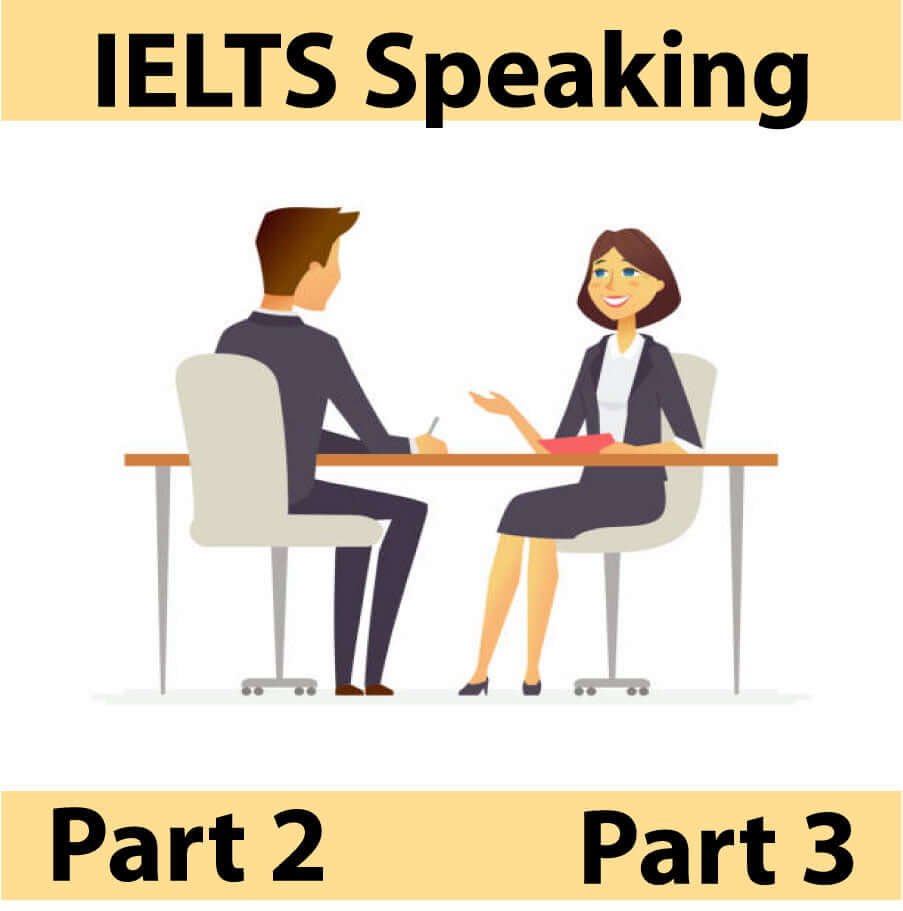Speaking IELTS part 2 and 3
Hello! How are you today! this is Ferdous is present here to help you with your speaking IELTS parts 2 and 3. There is some unique information that will help you to enrich your speaking skills. Let’s have a look!
Speaking IELTS Part 2 (two)
In this section of the test, you will be given a topic card and asked to speak on the topic for 1 to 2 minutes. Before you talk you have one minute to think about what you are going to say and you may make some notes during this time.
This section will detail the best ways of making notes. ?How to give introductions that leave a positive impression and how to develop your ideas.
Too often students make notes that do not assist them much at all. The following will teach you how to make the best notes for the 5 most common topics in Pat2: People, Places, Things/objects, activities, time/events.
Making Notes for part 2 cue card (Speaking)
Do not waste your precious one-minute preparation time as you will not get any extra points for starting your speech early. Use the time given to make as many notes as you can. So you don’t run out of ideas to talk about. Moreover, you can fluently complete the 2 minutes that you should be talking for.
During this one minute, you will also have the opportunity to organize your ideas so you can talk about them coherently and in a logical order which will cause less strain on the examiner.
When you make notes, only write down the key points and not every detail of your speech in full sentences.
So what are the key points? Key points are ideas in 1 or 2 words so that when you look at them, you immediately know what to say and how to keep talking.

Remember it’s difficult talking for 2 minutes so making the right notes is essential for success in part 2. Even though the topic card will give you 4 points to help you with ideas on how to develop your conversation, this is often not enough for most people, so making more notes will ensure you can keep speaking for 2 minutes.
Tips/ideas for making Notes
Below are notes you can generally use for most topics. However, you may need to pick and choose. Let’s get started:
Places: (Making note tips)
- Location
- Attractions
- Amenities
- Food
- Good/Bad points
- Traveler
- Secnery
- Industry
- People
- History
- Transport
- Historical patterns
People: (Making note guide)
- Name
- Appearance
- Jobs/ Studies
- Accomplishments
- What i like/ dislike
- Background information
- Personality
- Lifestyle
- Influence
- Bad/Good habbit
Objects: (making note tips)
- Background
- Appearance
- Fuctions
- Differences between simillar objects
- Good/ Bad points
- User
- Cautions
- Market value
- Maintainance
Time/ Events: (Making note tips)
- Time
- Place
- Significance
- Background
- People
- Activities
Activities: (Making note tips)
- Where
- When
- Who
- Influencer
- How
- Equipment
- Good/ Band points
- Admire
FAQ: Looking at your Notes
Can I look at the notes that I write while talking?
Answer: Yes you can look at the notes
Does it lower my score to look at my notes a lot?
You will not get a lower score if you look again and again. so the answer is yes you may look.
NB: You must check your notes during your speech. And don’t forget to look at the examiner.
It is true that if you look at the notes all the time, you will lose your naturalness. So one should keep an eye on the examiner to keep the naturalness right while speaking. So, try to make a balance by looking at your notes as often as you need rather than making sure you speak out naturally by looking up at the examiner.
For your better understand watch the video
Speech starting sentences/ Introductory sentences: Speaking IELTS part 2 and 3
What will you start the discussion with, what will be the starting sentence? Here are some guidelines:
The following sentences are ways of starting your part 2 talk. They are very general statements and can be used for a variety of topics. Be aware however that they cannot be used for absolutely every topic.
The following topic card will be used to show you how they can be used. Its a better tips for your IELTS Speaking test part 2 and 3.
Describe a TV Program you find informative.
You should say:
- What it is
- What content it has
- How often you can watch it and explain why you like it.
1: Tips-1
Rule-1: There are a number of (topic) but the one I’d particularly like to mention today is (your answer).
Sample answer: There are several TV programmes I find informative but the one I’d particularly like to mention today is “Super Structures” on Discovery.
2: Tips -2
Rule-2: When Talking about (topic), It’s worth pointing out (your answer)
Sample answer: When talking about TV Programmes I find informative, it’s worth pointing out “Super Structures” on Discovery.
3: Tips-3
Rule-3: In regards to saying a few words on (topic), I’d like to bring up (your answer).
Sample Answer: In regards to TV programmes i find informative, “super Structures” on Discovery rates a mention.
4: Tips-4
You can use it when little is known about the topic.
Rule-4: To tell you The truth I don’t have much to say on (topic) but I’ll do my best to talk about (your answer).
Sample Answer: To tell you the truth I don’t have much to say on TV Programmes but I’ll do my best to talk about ” Super Structures” on Discovery.
Speaking IELTS part 2 and part 3 : Most Recent Cards and Answers
Describe someone in your family who you really admire
You should say:
- What relation this person is to you?.
- What are your first memories of this person?.
- How often you see this person and explain why do you admire this person?.
Answer: Please don’t memorize any answer, you should write down by yourself and practice again and again
Speaking IELTS Part 2 is close here but you can learn more about IELTS Speaking Part 2, Let’s go for Part 3
IELTS Speaking Part 3
Here we will also use the QPS strategy to bring a good score.
Q= Identify the question
P= State a position
S=Offer support
In part 3 of the IELTS, you will have 4-5 minutes to respond to questions related to the part 2 topic. These questions will often be somewhat unfamiliar to you and may seem quite academic. This is the most difficult part of the test but remember your English is assessed not by your intelligence so producing an answer should be your first concern. Learn more about IELTS Speaking Part 3
This section follows the QPS strategy, so after identifying the question, promptly provide a position and then continue on to support that position. Make sure everything you say relates to your position or you may confuse the examiner. However, unlike part 2, there is no preparation time in part 3.
Types of part 3 questions and how to answer them
Question-Predicting
How will crime change/develop in the next few decades?
Do you think crime will be different in 50 years time?
Could you speculate/ predict what crime will be like 10 years from now?
Position- State certainty
Probably:
In all probability, there’ll be an increase in internet based crimes.
There’s every possibility that interne crimes will be on the increase.
It’s more than likely that the internet crime rate will increase significantly.
Probably not:
There’s a remote/slight prospect of the crime rate decreasing.
Support- Mixed strategies
I’d attribute it to the fact that criminal find it easier to hide their ident



